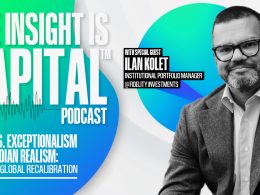by Greg Valliere, AGF Management Ltd.
Insights and Market Perspectives
THERE’S LITTLE DOUBT that on Wednesday the Federal Reserve will announce an aggressive policy of rate hikes and balance sheet reduction — but will Chairman Jerome Powell concede that there are reasons to go slow?
THE CENTRAL BANKERS are determined to crush inflation, and therefore will hike rates by 50 basis points for the next few meetings. And the Fed will reduce its balance sheet, perhaps by around $3 trillion over the next three years, according to a piece by Nick Timiraos in this morning’s Wall Street Journal.
THE CRUSADE AGAINST INFLATION has wide support in the political, economic and financial worlds. But just as the Fed, in retrospect, over-did its accommodation last year, there’s a chance that Powell could slam on the brakes too aggressively this year. Here are some reasons why:
1. China’s economy may be headed toward a growth recession as a result of its Draconian lockdowns — and new cases have been reported this morning outside of Shanghai. Until China declares a Covid all-clear, its export sector will suffer.
2. Europe’s export sector may improve because of the weak Euro, but energy shortages are an increasing threat to growth.
3. Despite a roaring jobs market, U.S. consumers think the economy and the stock market are in mediocre or poor condition, largely because of inflation. As we wrote last Friday, psychology is a major wild card; could fears of a weakening economy become a self-fulfilling prophecy?
4. Not only is monetary policy becoming less accommodative, but the growth of fiscal spending in the U.S. is dropping significantly. Congress is disinclined to spend much more money — and even if President Biden declares modest student loan relief via executive decree, it may face legal challenges.
5. Supply chain gridlock has improved at U.S. ports, but a potentially disruptive Longshoreman labor dispute looms on the West Coast. And the semiconductor chip shortage is not over.
6. Most importantly, the war in Ukraine may last for many more months. Each side claimed victories in battles over this past weekend, with mounting casualties and no signs of meaningful negotiations. A war lasting through the summer could have a devastating impact on food and fuel supplies.
WITH THESE WILD CARDS, Powell may have to consider a slowdown in the tightening pace by autumn. He probably will talk tough about inflation this week — and he should — but we think there are ample reasons to worry about over-doing the medicine.
The views expressed in this blog are those of the author and do not necessarily represent the opinions of AGF, its subsidiaries or any of its affiliated companies, funds or investment strategies.
The views expressed in this blog are provided as a general source of information based on information available as of the date of publication and should not be considered as personal investment advice or an offer or solicitation to buy and/or sell securities. Speculation or stated believes about future events, such as market or economic conditions, company or security performance, or other projections represent the beliefs of the author and do not necessarily represent the view of AGF, its subsidiaries or any of its affiliated companies, funds or investment strategies. Every effort has been made to ensure accuracy in these commentaries at the time of publication; however, accuracy cannot be guaranteed. Market conditions may change and AGF accepts no responsibility for individual investment decisions arising from the use of or reliance on the information contained herein. Any financial projections are based on the opinions of the author and should not be considered as a forecast. The forward looking statements and opinions may be affected by changing economic circumstances and are subject to a number of uncertainties that may cause actual results to differ materially from those contemplated in the forward looking statements. The information contained in this commentary is designed to provide you with general information related to the political and economic environment in the United States. It is not intended to be comprehensive investment advice applicable to the circumstances of the individual.
AGF Investments is a group of wholly owned subsidiaries of AGF Management Limited, a Canadian reporting issuer. The subsidiaries included in AGF Investments are AGF Investments Inc. (AGFI), AGF Investments America Inc. (AGFA), AGF Investments LLC (AGFUS) and AGF International Advisors Company Limited (AGFIA). AGFA and AGFUS are registered advisors in the U.S. AGFI is a registered as a portfolio manager across Canadian securities commissions. AGFIA is regulated by the Central Bank of Ireland and registered with the Australian Securities & Investments Commission. The subsidiaries that form AGF Investments manage a variety of mandates comprised of equity, fixed income and balanced assets.
About AGF Management Limited
Founded in 1957, AGF Management Limited (AGF) is an independent and globally diverse asset management firm. AGF brings a disciplined approach to delivering excellence in investment management through its fundamental, quantitative, alternative and high-net-worth businesses focused on providing an exceptional client experience. AGF’s suite of investment solutions extends globally to a wide range of clients, from financial advisors and individual investors to institutional investors including pension plans, corporate plans, sovereign wealth funds and endowments and foundations.
For further information, please visit AGF.com.
©2022 AGF Management Limited. All rights reserved.
This post was first published at the AGF Perspectives Blog.














